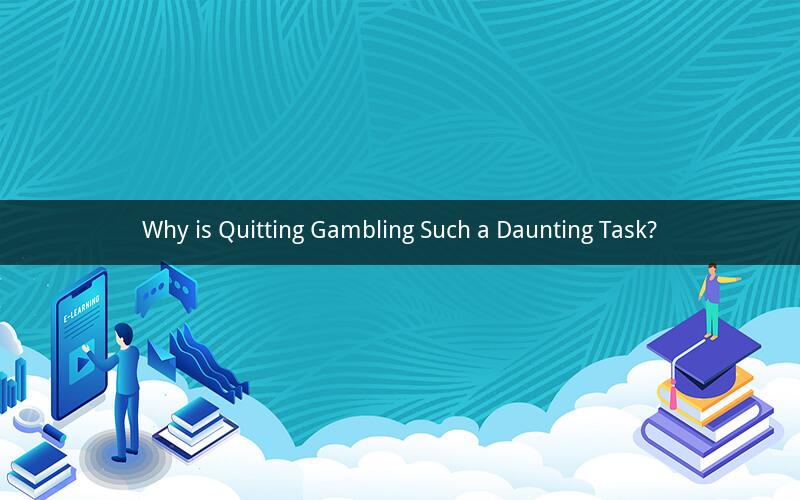
The allure of gambling has been a topic of debate for centuries, with many individuals struggling to overcome the habit. The reason why quitting gambling is so challenging is multifaceted, encompassing psychological, social, and biological factors. This article explores the reasons behind the difficulty in stopping gambling and provides insights into how individuals can overcome this addiction.
1. The psychological aspects of gambling
One of the primary reasons why quitting gambling is hard is due to the psychological aspects involved. The excitement and thrill of placing a bet can lead to a release of dopamine in the brain, creating a sense of euphoria and happiness. This psychological reinforcement can make it difficult for individuals to resist the urge to gamble, as they seek to replicate that feeling.
a. The thrill of taking risks
Gambling often involves taking risks, which can be thrilling for some individuals. The anticipation of winning and the potential for large payouts can be a powerful motivator, making it hard for gamblers to stop.
b. The desire for control
Many gamblers seek to regain control over their lives by gambling. When they win, they may feel as though they have a handle on their destiny, while losses can make them believe that they have no control over their financial situation. This desire for control can be a significant factor in the difficulty of quitting gambling.
2. Social aspects of gambling
Gambling is often intertwined with social activities, which can exacerbate the problem. Many individuals engage in gambling as a way to spend time with friends or as a form of entertainment. The social aspect of gambling can make it more difficult to quit, as individuals may be reluctant to miss out on these experiences.
a. The influence of social peers
When individuals see their friends or family members gambling and enjoying themselves, they may feel pressure to join in. This social pressure can make it hard for them to resist the temptation to gamble, even when they know it's harmful.
b. The desire to fit in
Many individuals feel the need to fit in with their social circles. If gambling is a common activity among their friends, they may feel obligated to participate, even if they know it's detrimental to their well-being.
3. Biological factors in gambling addiction
The human brain is hardwired to seek pleasure and avoid pain. This is due to the release of dopamine, a neurotransmitter responsible for the feeling of happiness. When individuals gamble, they are stimulating the release of dopamine, which can lead to an addiction. The biological aspect of gambling addiction can make it difficult for individuals to stop, as their bodies and minds crave the pleasurable sensation of gambling.
a. The release of dopamine
When individuals win at gambling, their brains release dopamine, which creates a pleasurable sensation. This reward system can make it difficult for individuals to resist the urge to gamble, as they seek to replicate that feeling.
b. The development of tolerance
As individuals continue to gamble, they may develop a tolerance to the pleasurable sensations associated with winning. This can lead to an increased need to gamble in order to achieve the same level of pleasure, making it even harder to quit.
Overcoming gambling addiction
Understanding the reasons why quitting gambling is hard can help individuals develop strategies to overcome their addiction. Here are some suggestions for those struggling to stop gambling:
1. Seek professional help
Therapy and counseling can provide individuals with the tools and support they need to overcome their gambling addiction. A therapist can help them identify the root causes of their addiction and develop strategies to manage their cravings.
2. Create a support system
Surrounding oneself with supportive friends and family members can make it easier to overcome a gambling addiction. These individuals can provide encouragement and hold the individual accountable for their actions.
3. Develop a healthy lifestyle
Engaging in regular exercise, eating a balanced diet, and getting enough sleep can help individuals manage their cravings and improve their overall well-being. A healthy lifestyle can provide a sense of control and purpose, reducing the urge to gamble.
4. Find alternative activities
Finding new hobbies or interests can help individuals fill the void left by gambling. Activities such as sports, arts, and community involvement can provide a sense of fulfillment and distraction from the temptation to gamble.
5. Establish boundaries
Setting clear boundaries and limits for gambling can help individuals manage their addiction. This may involve removing credit cards, avoiding casinos and other gambling venues, and informing friends and family about the limits they have set.
Frequently asked questions
1. How common is gambling addiction?
Gambling addiction is relatively common, with estimates suggesting that up to 6% of the global population may be affected.
2. Can gambling addiction be cured?
Gambling addiction is a chronic condition, but it can be managed and overcome with proper treatment and support.
3. How can I tell if I have a gambling addiction?
If you find yourself spending increasing amounts of time and money on gambling, and if it's negatively impacting your life, you may have a gambling addiction.
4. Can I quit gambling on my own?
While some individuals may be able to quit gambling on their own, many benefit from seeking professional help and support from friends and family members.
5. What is the most effective treatment for gambling addiction?
The most effective treatment for gambling addiction varies from person to person. Some individuals may find success with therapy and counseling, while others may benefit from support groups or residential treatment programs. It's essential to find the right treatment plan tailored to your specific needs.